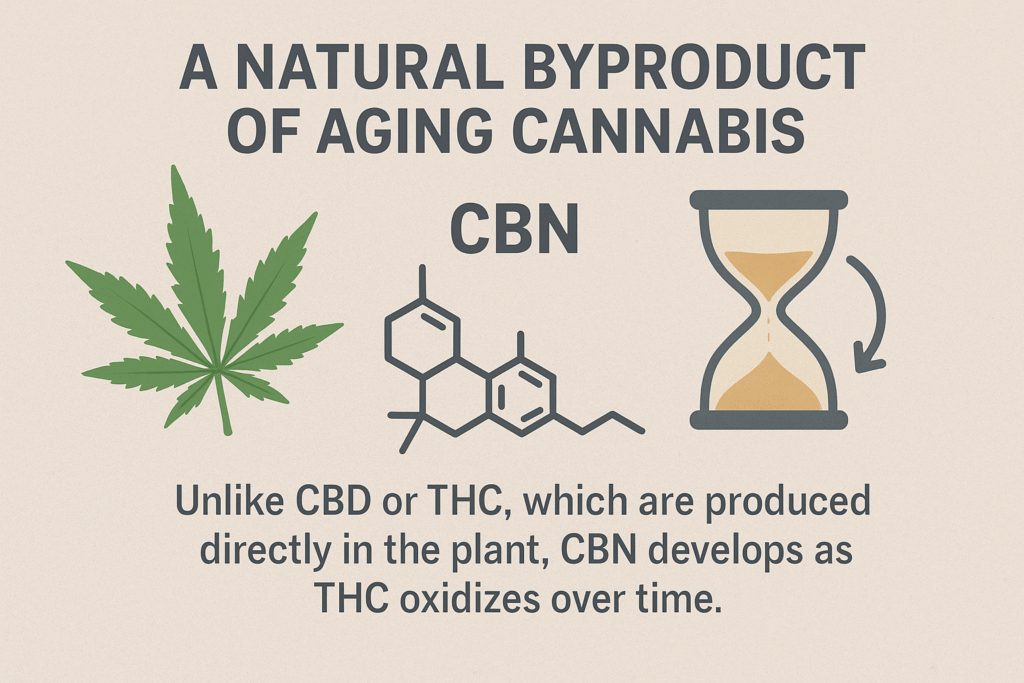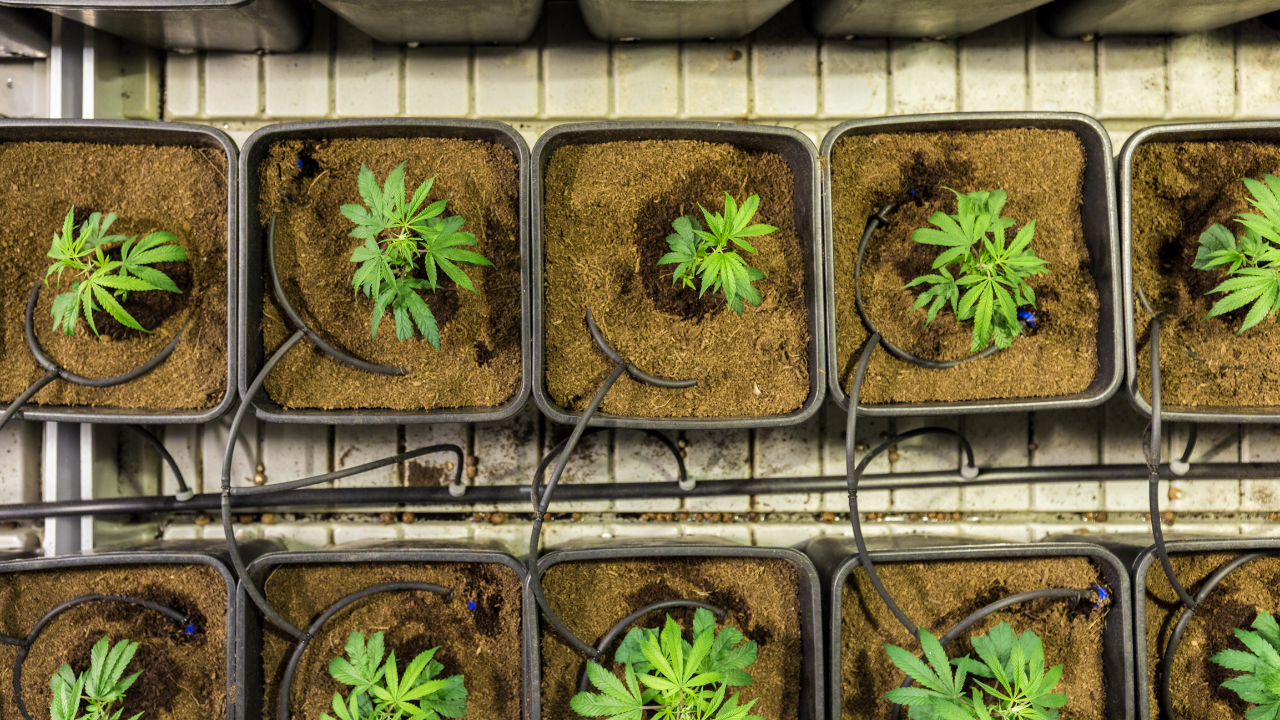Table of Contents
Did you know that the cannabis plant continues to surprise researchers with compounds beyond the familiar CBD and THC? With over 100 cannabinoids identified, science is only beginning to uncover how these lesser-known molecules may support human health. While CBD is known for its calming effects and THC for its psychoactive properties, there’s another cannabinoid quietly gaining attention – CBN (Cannabinol).
Often called the “sleep cannabinoid,” CBN is being studied for its potential to promote rest, relaxation, and recovery. Unlike THC, it doesn’t deliver a strong high, and unlike CBD, it’s not widely available in wellness products just yet. But as more consumers seek natural sleep solutions, CBN is emerging as one of the most talked-about rare cannabinoids.
In this article, we’ll explore what CBN is, how it’s formed, why it’s linked to sleep, what researchers are discovering about its other potential benefits, and how it compares to CBD and THC. If you missed our first guide on CBG (Cannabigerol) – “The Mother Cannabinoid” in this series, be sure to check it out to see how these rare cannabinoids are connected.
What Is CBN?
CBN, short for Cannabinol, is a naturally occurring cannabinoid that forms when THC ages and breaks down. That’s why older cannabis tends to have higher levels of CBN compared to fresh flower. While THC is psychoactive, the conversion into CBN reduces its potency, making CBN only mildly intoxicating at very high doses—most people describe it as relaxing rather than euphoric.
Unlike CBG (the “mother cannabinoid,” which acts as a building block for other cannabinoids), CBN is more like the “after-effect cannabinoid,” produced through the natural degradation process of THC. This unique origin is part of what makes CBN so intriguing: it represents the transformation of cannabis chemistry over time.
Why Is CBN Called the “Sleep Cannabinoid”?
The nickname “sleep cannabinoid” isn’t just clever marketing—it comes from both scientific observations and consumer experiences that tie CBN to rest, relaxation, and nighttime use. But the story is a little more nuanced than many realize.
1. Origins in Early Research
Back in the 1970s, researchers began investigating the effects of different cannabinoids on sleep and sedation. One early study suggested that CBN might prolong sleep time in animals, especially when combined with THC. This was one of the first scientific clues linking CBN to restfulness, and it sparked the idea that CBN could act as a natural sedative.
2. A Natural Byproduct of Aging Cannabis

Unlike CBD or THC, which are produced directly in the plant, CBN develops as THC oxidizes over time. This is why older cannabis—stored for months or years—tends to have higher concentrations of CBN. Historically, users noticed that aged cannabis often felt “sleepier” or more relaxing, which further reinforced CBN’s association with drowsiness.
3. Sedative Potential and Relaxation Effects
Although research on humans is still limited, anecdotal reports and early findings suggest that CBN may:
- Encourage a sense of calm and physical relaxation.
- Work synergistically with THC to enhance sedative effects.
- Help users feel more ready for rest, especially when paired with sleep-friendly terpenes like myrcene or linalool.
It’s important to note that most scientists agree CBN alone is probably not a powerful sedative. Instead, it appears to play a supporting role in the entourage effect, where multiple cannabinoids and terpenes work together to influence the body’s endocannabinoid system.
4. The Consumer Experience
Today, many wellness brands highlight CBN in sleep tinctures, gummies, and softgels, often pairing it with CBD or melatonin. Users frequently describe these products as promoting deeper rest, reduced nighttime wakeups, and a gentler transition into sleep compared to pharmaceutical aids.
5. What the Science Says So Far
While more clinical trials are needed, researchers believe CBN may interact with CB1 receptors in the brain and nervous system in a way that subtly promotes drowsiness without heavy intoxication. This makes it especially appealing for people who want sleep support without the next-day grogginess often linked to conventional sleep medications.
In short, CBN has earned the title of “sleep cannabinoid” because of its connection to aged cannabis, its synergy with THC and terpenes, and mounting anecdotal evidence that it helps people wind down at night. While we’re still waiting for definitive proof, both history and modern wellness culture continue to cement its reputation as nature’s bedtime cannabinoid.
Potential Benefits of CBN Beyond Sleep
While CBN is best known as the “sleep cannabinoid,” researchers are uncovering other areas where it may play an important role in health and wellness. Like many rare cannabinoids, most of these findings are still in the early stages, but the potential is exciting.
1. Pain Relief Support

Preclinical research indicates that CBN may interact with the body’s pain-regulating pathways. When combined with other cannabinoids like CBD or THC, it may help enhance overall pain management, making it a potential option for those seeking natural alternatives for chronic discomfort.
2. Anti-Inflammatory Properties
Inflammation contributes to many modern health concerns, from arthritis to autoimmune issues. Early lab studies suggest CBN may have anti-inflammatory properties, which could open doors for future therapeutic use in joint pain or inflammatory disorders.
3. Appetite Stimulation
Unlike CBD, which is sometimes linked to appetite suppression, CBN appears to have the opposite effect. Evidence points to its ability to stimulate appetite, which could be beneficial for individuals dealing with appetite loss due to illness or medical treatments.
4. Neuroprotection
One of the most promising areas of CBN research is its impact on the brain. A 2025 study published on PubMed found that CBN may alleviate age-related cognitive decline by supporting mitochondrial function in neurons. Similarly, scientists reported that CBN shows potential in protecting brain cells from aging and neurodegeneration. These findings position CBN as a cannabinoid worth watching for long-term brain health support.
5. Antibacterial Potential
CBN has also demonstrated antibacterial activity in lab studies, including effectiveness against MRSA, a type of bacteria resistant to many antibiotics. While far from a replacement for antibiotics, this highlights the cannabinoid’s versatility and untapped potential.
Taken together, these findings show that CBN isn’t just about better sleep—it may also offer benefits for pain relief, inflammation, appetite support, brain health, and even antibacterial defense. As highlighted by multiple studies and expert reviews, CBN is a cannabinoid with diverse therapeutic potential that science is only beginning to uncover.
How Does CBN Compare to CBD and THC?
When people first hear about CBN, the natural question is: how does it stack up against the big two, CBD and THC? While all three cannabinoids come from the same plant, their effects and roles in wellness are quite different.
CBN vs. CBD
- Similarities: Like CBD, CBN is non-intoxicating. That means it won’t give you a “high,” making it appealing for those who want therapeutic effects without psychoactive side effects. Both compounds also show promise in areas like pain management, inflammation reduction, and neuroprotection.
- Differences: CBD is much more studied and widely available. It’s often considered a “balancing” cannabinoid, supporting stress, anxiety, and overall wellness. CBN, on the other hand, has earned its reputation primarily for sleep support. While CBD may help some users unwind, CBN appears more directly linked to sedation and nighttime relaxation.
(Tip: If you’re curious about CBD’s close cousin, you may want to read our article on CBG – “The Mother Cannabinoid” to see how these lesser-known compounds compare.)
CBN vs. THC
- Similarities: CBN is actually a breakdown product of THC. Over time, as THC ages or is exposed to heat and oxygen, it converts into CBN. Because of this relationship, the two share some overlapping qualities, such as potential appetite stimulation and pain relief.
- Differences: The key distinction is that THC is intoxicating, while CBN is not. THC binds strongly to CB1 receptors in the brain, producing the classic cannabis “high.” CBN interacts with these receptors much more weakly, which explains why it doesn’t cause intoxication. Instead, its most consistent effect is promoting relaxation and potentially extending sleep duration.
The Bottom Line
Think of CBD, THC, and CBN as three unique tools in the cannabinoid toolkit:
- CBD: Broad support for mood, stress, inflammation, and balance.
- THC: Strong effects on mood, appetite, and pain—but with intoxication.
- CBN: Specializes in sleep and nighttime calm, with bonus potential in neuroprotection, pain, and inflammation.
Together, they illustrate the “entourage effect”- the idea that cannabinoids may work better in combination than alone. As research continues, CBN may prove to be an important complement to CBD and THC, especially for people seeking natural sleep solutions.
Is CBN Legal and Available?
The legal status of CBN can vary. In many regions where hemp-derived cannabinoids are legal, CBN products made from hemp (containing less than 0.3% THC) are available online and in specialty wellness shops. However, because CBN is often extracted from THC, regulations can be complex and vary by jurisdiction.
Product availability is still limited compared to CBD, but as demand for natural sleep aids grows, more CBN tinctures, capsules, and edibles are entering the market.
Final Thoughts: Could CBN Be the Future of Natural Sleep Support?
CBN may not yet be a household name like CBD or THC, but it’s quickly earning a reputation as a natural sleep and relaxation aid. While more research is needed to confirm its full range of benefits, early findings suggest CBN could play a unique role in wellness, particularly for those seeking rest and recovery without heavy sedation or intoxication.
As cannabis research expands, rare cannabinoids like CBN highlight the untapped potential of the plant. From sleep support to possible neuroprotective and antibacterial properties, CBN is more than just the “sleep cannabinoid”—it’s a window into the future of cannabis science.
If you’re exploring rare cannabinoids, make sure to also read our full guide on CBG – “The Mother Cannabinoid”, and keep an eye out for the next installment on CBC – “The Mood Cannabinoid”.
Frequently Asked Questions About CBN
Does CBN really make you sleepy, or is it just marketing hype?
Research suggests CBN may support sleep, but evidence is still limited. Its calming and sedative reputation comes mostly from early studies and anecdotal experiences. Scientists believe CBN may work best when combined with THC and certain terpenes, rather than acting as a strong standalone sleep aid.
Is CBN stronger than CBD for sleep and relaxation?
CBN is often marketed specifically for sleep, while CBD is better known for overall relaxation, stress relief, and inflammation support. Some users find CBN more effective for rest, but responses vary. In many cases, blends of CBD + CBN are reported to deliver the best results.
Will CBN get me high like THC?
No, CBN is only mildly psychoactive at very high doses. Most people who use CBN in typical wellness amounts don’t experience a high. Instead, they describe a sense of calm, relaxation, or drowsiness.
How much CBN should I take for sleep support?
There is no universal dosage since research is still ongoing. Many CBN products suggest starting with a low dose (around 5–10 mg) and adjusting gradually. Individual factors such as body weight, metabolism, and whether it’s taken with other cannabinoids also influence effects.
Is CBN safe to use every night?
Early research and user reports suggest CBN is generally well-tolerated, but long-term safety studies are limited. As with any supplement, it’s best to consult a healthcare professional—especially if you’re already taking medications or have a medical condition.
Can I find CBN naturally in cannabis flower, or do I need special products?
Yes, CBN naturally occurs in aged cannabis flower because it forms as THC breaks down. However, the levels are usually small. To get a consistent amount, most people use extracts, tinctures, or gummies specifically formulated with added CBN.
Sources:
- A sleepy cannabis constituent: cannabinol and its active metabolite influence sleep architecture in rats. Neuropsychopharmacology. https://doi.org/10.1038/s41386-024-02018-7
- Effects of cannabinol on sleep: early animal research. PMC, National Institutes of Health. https://www.ncbi.nlm.nih.gov/pmc/articles/PMC8612407/
- Cannabinoids offer new hope for safe and effective pain relief. Yale News. https://news.yale.edu/2025/01/21/cannabinoids-offer-new-hope-safe-and-effective-pain-relief
- Antioxidative and anti-inflammatory properties of cannabinoids in lab studies. PMC, National Institutes of Health. https://www.ncbi.nlm.nih.gov/pmc/articles/PMC7023045/
- Cannabinol alleviates age-related cognitive decline by activating mitochondrial function in neurons. PubMed. https://pubmed.ncbi.nlm.nih.gov/40412024/
- The anti-biofilm activity of cannabinoids against methicillin-resistant bacteria. PubMed. https://pubmed.ncbi.nlm.nih.gov/40844832/
- CBN for sleep: separating fact from fiction. Sleep Foundation. https://www.sleepfoundation.org/sleep-aids/cbn-for-sleep
- Beyond THC and CBD: can cannabinoid CBN help with sleep? Green Goddess Collective. https://greengoddesscollective.com/beyond-thc-and-cbd-can-the-new-cannabinoid-cbn-help-with-sleep/














